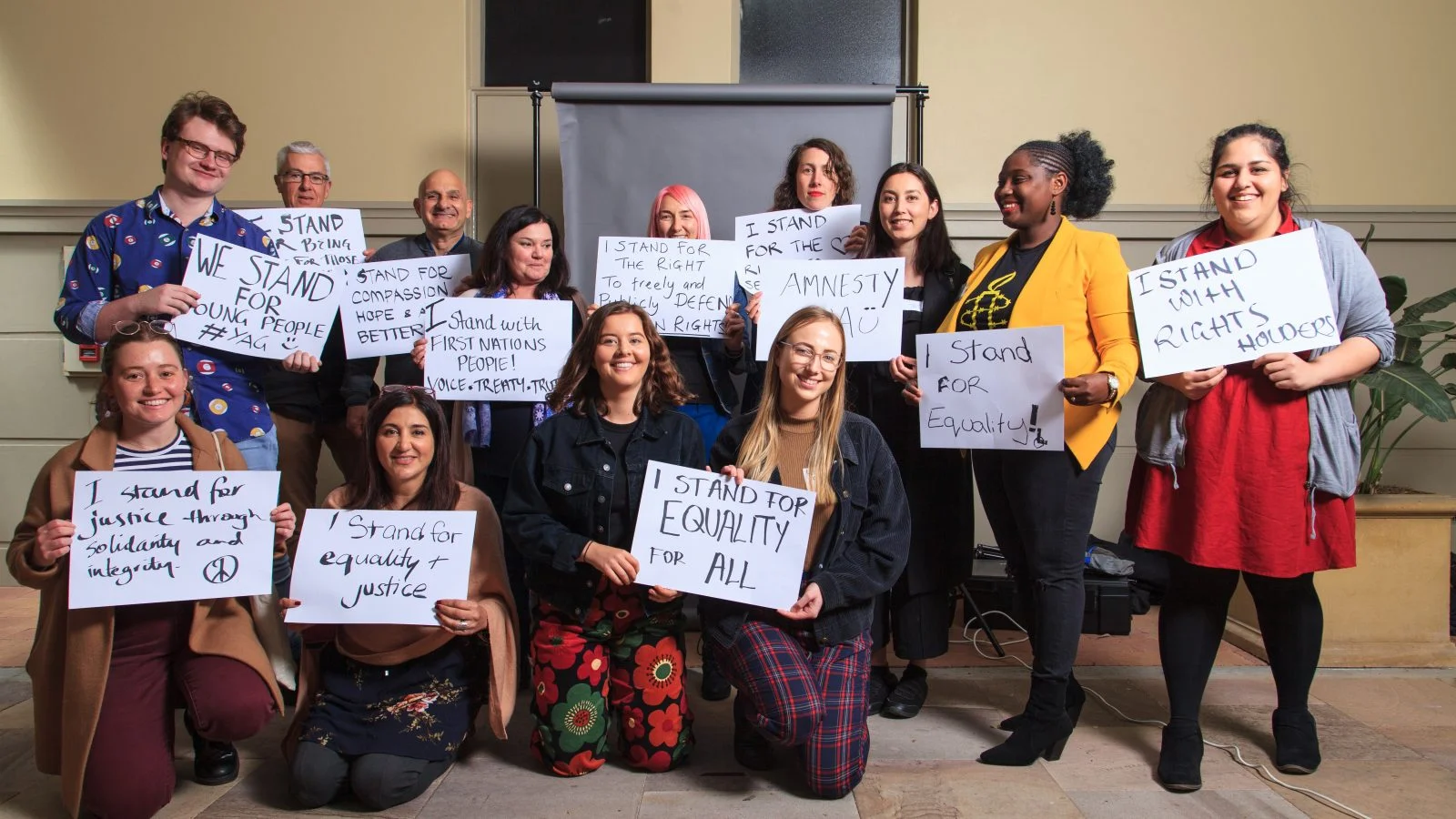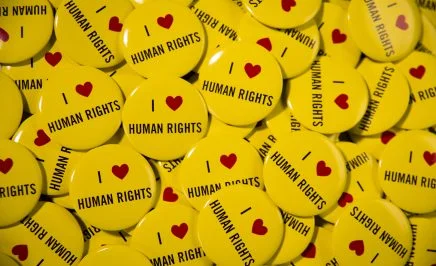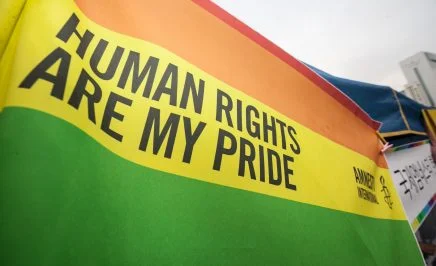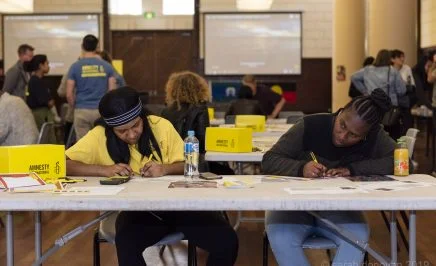Fundamental human rights in Australia such as the right to assembly, peaceful protest and freedom of speech are under threat. Now more than ever, establishing an Australian Human Rights Act is crucial.
Australia is the only liberal democracy in the world without a federal Human Rights Act. Anti-discrimination laws protect people’s right to live free from discrimination. But if you’re denied rights such as healthcare or education, there’s no framework to challenge the system.
While some states do have Human Rights Acts, without one enshrined in federal law, there’s no way to challenge injustice when human rights violations occur. The government is failing to protect, respect, and fulfil human rights, as is its responsibility under international law.
Below are a few examples of specific issues and rights abuses that highlight the urgent need for an Australian Human Rights Act.
Climate Justice
Climate change has caused a dramatic rise in climate emergencies across Australia, including bushfires, floods and rising sea levels. The effects of these emergencies include the destruction of homes, loss of food and water sources, as well as loss of livelihood.
Indigenous people are at the forefront of the climate crisis and climate justice. Rising seas, increasing temperatures and changing biodiversity are already preventing communities from exercising their rights to self-determination, practice culture, and the right to life, health, housing, food and water.
Rising sea levels have destroyed homes, schools and sacred sites such as cemeteries across the island. Due to coastal erosion and rising sea levels, inhabitants risk becoming Australia’s first climate refugees. If the inhabitants lose the island, they lose their culture, identity and spiritual connection to their home.
But when human rights standards are protected in law with a Human Rights Act people can take action to realise their rights and climate justice.
First Nations activists in Queensland used the state Human Rights Act to challenge the approval of a Galilee basin coal project in the first Australian case linking human rights and climate change.
In a historic ruling the court recommended the refusal of the Galilee basin coal project on the grounds that it would infringe upon the human rights of future generations.
In the United States last year, a court ruled in favour of a group of young activists who accused officials in the state of Montana of violating their rights contained in the state constitution to a clean and healthful environment by supporting pro-fossil fuel policies,
This ruling demonstrates the vital importance of human rights laws in pushing for the change necessary to avert a growing climate catastrophe and will help drive forward climate justice.
We need a federal Human Rights Act so we can help people fight for their right to a healthy environment. By having these rights enshrined in law, people could challenge Federal Government approval of coal mines.
Reproductive rights
We must protect the right to access healthcare, particularly reproductive healthcare, which is under threat worldwide. In Australia, people don’t have equal access to vital reproductive healthcare services, particularly in rural areas. By having a Human Rights Act, we can better protect the right to healthcare under federal law.
An ongoing research project by Monash University has found that people are travelling and paying for abortions out of pocket. Furthermore, there is often not enough information being provided about reproductive healthcare, especially in rural towns. The system is different across Australia, meaning that while someone in South Australia may be able to access an abortion free of charge at a public hospital, someone from Perth might have to fly across the country and pay thousands out of pocket.
A Human Rights Act would force the government to consider human rights when making decisions on funding and delivering reproductive healthcare services. Together, we can create a future where all of our rights, including our right to access affordable reproductive healthcare, are protected.
Education
Education is a fundamental human right, but Australia’s current framework doesn’t protect it.
Human rights standards recognise the right of everyone to education. Article 26 of the Universal Declaration of Human Rights states that “Education shall be free, at least in the elementary and fundamental stages. Elementary education shall be compulsory. Technical and professional education shall be made generally available and higher education shall be equally accessible to all on the basis of merit.”
The distribution of school funding in Australia is inequitable, with public schools receiving less funding than private schools per student. Not only do public schools remain underfunded, but the quality of education provided suffers as a result.
In the ACT, the system charged children and young people for their education if those people were refugees or asylum seekers. The Human Rights and Discrimination Commissioner used the territory’s Human Rights Act to develop new policies ensured children ‘s right to free education.
To enact similar change for everyone in Australia, we need a Human Rights Act that ensures free and equal access to education for all.
Robodebt
The Robodebt scheme was an unlawful scheme that Morrison government implemented to collect alleged overpayments from welfare recipients. This flawed system forced many people to pay debts that they never owed. The government unjustly demanded repayment and shifted the burden of proof onto the accused.
A Royal Commission into the scheme found that it was unlawful. The government subsequently abolished it in 2019 and settled in a class-action lawsuit. However, the damage was already done with the scheme putting hundreds of thousands of vulnerable Australians in extreme financial and psychological stress. Shockingly, the Royal Commission also revealed that the Morrison government had released personal information about Robodebt victims to the media.
If we had a Human Rights Act, the government would have been forced to consider people’s human rights before rolling out the scheme, and while implementing it. Furthermore, when the policy breached human rights like privacy, there would have been a legal framework to challenge the policy and remedy those breaches. There would be consequences for the government’s failure to consider and protect people’s human rights.
Next steps
The government is currently conducting an inquiry into Australia’s human rights framework, to review how to better protect human rights under federal law. The inquiry is considering legislating a Human Rights Act, which would protect fundamental human rights under the law. We’re expecting a report with findings and recommendations by 31 May 2024.
According to Amnesty’s Human Rights Barometer research, a Human Rights Act (HRA) is still strongly supported by the Australian public.
- A vast majority (75%) of Australians support the introduction of an HRA when told Australia doesn’t currently have one.
- Knowing that Australia is the only liberal democracy without an HRA again bolsters the case for its introduction: 59% of the sample become more supportive when they know this.
- One fifth (22%) felt an HRA would provide important protection for vulnerable people and those who could not speak up for themselves.
- 10% felt that an HRA would simplify current laws and provide commonly agreed standards.
Amnesty has recommended that the Federal Government prioritises protecting human rights through a Human Rights Act.
A Human Rights Act will:
- Prevent human rights abuses by forcing the government to consider human rights when passing laws, making decisions about policies, and delivering services
- Provide an avenue for people to take action and challenge injustice when they experience human rights abuses
- Provide remedies for people who experience human rights abuses.
With a Human Rights Act, we can create better lives for ourselves, our communities, and for those around us.
Read our submission to the enquiry and learn more about how we can ensure everyone’s rights are respected and protected.







